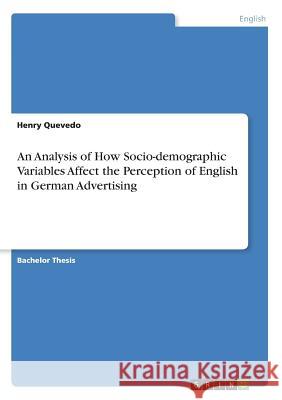An Analysis of How Socio-demographic Variables Affect the Perception of English in German Advertising » książka
An Analysis of How Socio-demographic Variables Affect the Perception of English in German Advertising
ISBN-13: 9783668921504 / Angielski / Miękka / 2019 / 56 str.
An Analysis of How Socio-demographic Variables Affect the Perception of English in German Advertising
ISBN-13: 9783668921504 / Angielski / Miękka / 2019 / 56 str.
(netto: 188,44 VAT: 5%)
Najniższa cena z 30 dni: 195,16
ok. 16-18 dni roboczych.
Darmowa dostawa!
Bachelor Thesis from the year 2018 in the subject English Language and Literature Studies - Linguistics, grade: 2,0, University of Würzburg (Neuphilologisches Institut - Anglistik und Amerikanistik), course: Bachelorarbeit, language: English, abstract: The research question of this thesis is how sociodemographic variables affect the perception of English in German Advertising. "English seems to be surrounded by an aura that the German language is apparently missing". With regard to advertising in Germany, it becomes difficult to disagree with this statement by Schlüter. For several decades anglicisms and English expressions have been used for promotional purposes in television-, print-, and online-advertising. "Professional Hair Care for you", "Powered by Emotion" and "Driven by Instinct" are only a few of the many popular slogans in Germany.The "aura" has been utilized by companies in multiple industries for many years resulting in a consistent growth in the number of anglicisms and English expressions used in the past. This quantitative increase has been exhibited by many researchers, most notably by Schütte. She concluded that from 1951 until 1991 the amount of anglicisms in the slogans, headlines and continuous texts of her corpus of print advertisements grew by over 400%. In her corpus Slogans featured an especially high increase of anglicisms, growing from 5 in 1951 to 153 in 1991. Meder came to similar realization, denoting a great increase of anglicisms used in selected German men's and women's magazines in the years 1983, 1993 and 2003. This trend of anglicisms and English expressions being incorporated into the German language - and also advertising - is presumed to continue with the number of expressions deriving from the English language increasing.Hence, the quantitative presence of the English language in German advertising is virtually undeniable. However, advertising is a form of communication in which the advertiser's objective is to generate a certain attitude within the recipient towards the advertising object. Thus, it is of substantial value to understand who perceives advertising containing English in the way the advertiser wishes it to be perceived. Past studies that have dealt with the perception of English and anglicisms in advertising oftentimes merely focused on the factor of comprehension. Researchers concluded that the positive perception of English correlated with the person's command of English. Hence, the question remains who perceives the "aura" of the English language in advertising and which variables influence their respective perception.











